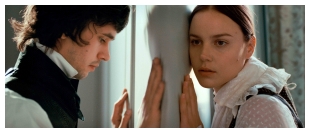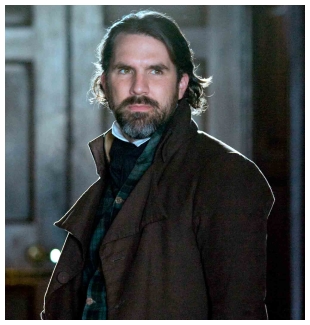Guess I'm going to have to reevaluate my opinion of The Piano. I was one of those backlash guys, one of the ones who read all the effulgent praise about the film, the stuff elevating it to hitherto unknown heights as a stunning, sensuous cinematic event, and anticipated an experience that would forever change my notions of cinematic storytelling. What little I remember of my exposure to the movie centered on the loving display of Harvey Keitel's unit. Nothing particularly wrong with Harvey Keitel's unit, it just wasn't what I'd bought my ticket for.
 The plus side of being a film journalist is that you can get to a movie before the hype begins, before the superlatives get ladled on and the talents of a nuanced and intelligent filmmaker such as Jane Campion get blown all out of proportion. Campion's newest film, Bright Star -- her first feature in some four years -- is likely to get all possible variations of "romantic," "beautiful," and "sensuous" tagged to it, but don't let that blind you. Behind the sumptuous trappings -- and, yeah, the film is beautiful, no argument -- there remains Campion's typical, incisive examination of the conflict between repression and passion, the creative heart and societal strictures.
The plus side of being a film journalist is that you can get to a movie before the hype begins, before the superlatives get ladled on and the talents of a nuanced and intelligent filmmaker such as Jane Campion get blown all out of proportion. Campion's newest film, Bright Star -- her first feature in some four years -- is likely to get all possible variations of "romantic," "beautiful," and "sensuous" tagged to it, but don't let that blind you. Behind the sumptuous trappings -- and, yeah, the film is beautiful, no argument -- there remains Campion's typical, incisive examination of the conflict between repression and passion, the creative heart and societal strictures.
 The story is built around the relationship between poet John Keats (Ben Whishaw) -- published but impoverished -- and Fanny Brawne (Abbie Cornish), a woman who vents her creative soul through her exquisite skills as a seamstress and can hold her own in repartee with the educated Mr. Keats. It is observed by Fanny's family -- including Campion stalwart Kerry Fox -- and Charles Brown (Paul Schneider), whose dim view of the budding romance may not solely be motivated by its potential to derail Keats' career. And it is played out in a world of rigidly formalized courtship rituals and a heightened sensitivity to scandal, not necessarily the perfect environment for genuine love.
The story is built around the relationship between poet John Keats (Ben Whishaw) -- published but impoverished -- and Fanny Brawne (Abbie Cornish), a woman who vents her creative soul through her exquisite skills as a seamstress and can hold her own in repartee with the educated Mr. Keats. It is observed by Fanny's family -- including Campion stalwart Kerry Fox -- and Charles Brown (Paul Schneider), whose dim view of the budding romance may not solely be motivated by its potential to derail Keats' career. And it is played out in a world of rigidly formalized courtship rituals and a heightened sensitivity to scandal, not necessarily the perfect environment for genuine love.
The film, in short, is sweet, sad, and moving but with Campion's astringent edge keeping the proceedings from lapsing into sentimentality. And that makes all the difference.
That, and the fact that you won't get distracted by Harvey Keitel's unit.
Click on the player below to hear my interview with Ben Whishaw and Paul Schneider.
The Course of True Love on MMP:
More MMP on HuffPost:
